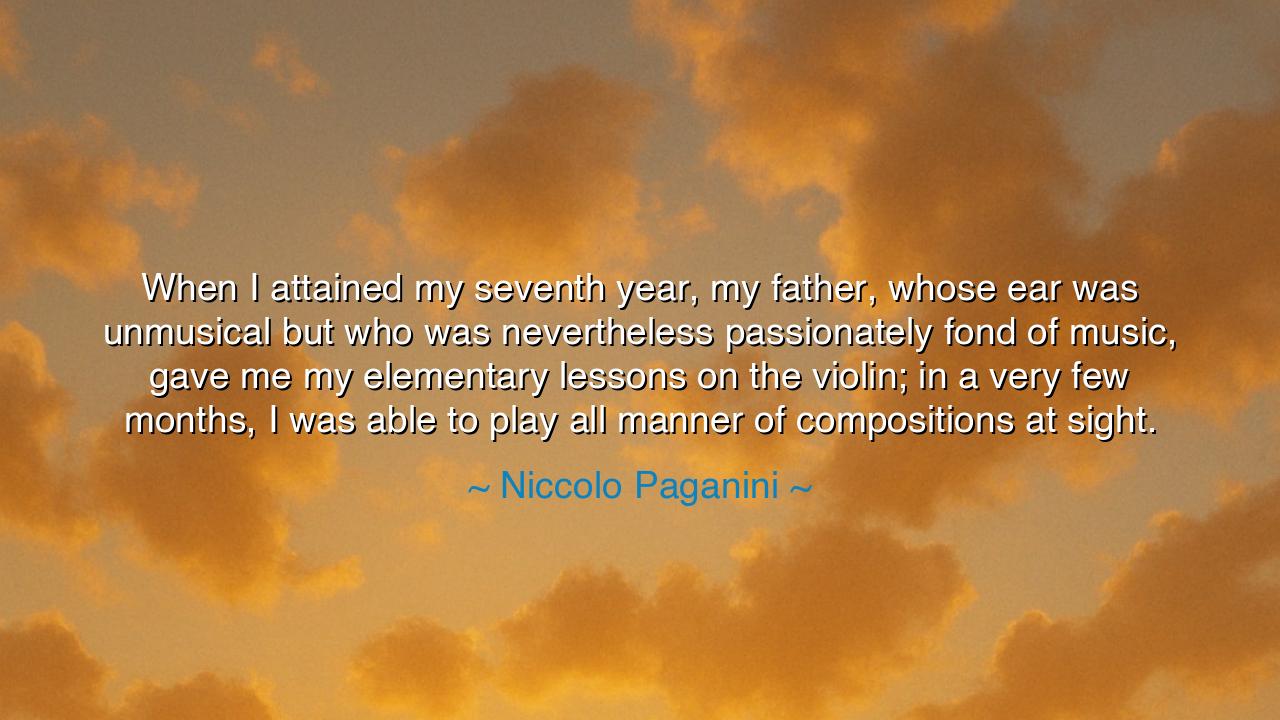
When I attained my seventh year, my father, whose ear was
When I attained my seventh year, my father, whose ear was unmusical but who was nevertheless passionately fond of music, gave me my elementary lessons on the violin; in a very few months, I was able to play all manner of compositions at sight.






The words of Niccolò Paganini — “When I attained my seventh year, my father, whose ear was unmusical but who was nevertheless passionately fond of music, gave me my elementary lessons on the violin; in a very few months, I was able to play all manner of compositions at sight.” — are filled with the wonder of genius and the quiet truth of beginnings. Paganini, the fiery virtuoso whose name would become legend, confesses here that his path was kindled not by a master of sound, but by a father who, though unskilled, carried within him a burning passion for music. From this humble origin came the flame that would one day dazzle Europe and reshape the very art of the violin.
This truth has been known since ancient days: that greatness often begins not in perfection, but in passion. The Greeks told of Achilles, trained not first by gods, but by Chiron, the wise centaur, who gave him the foundations of strength and virtue. So too with Paganini — though his father lacked the gift of perfect pitch, his love of music created the soil in which his son’s genius could grow. From love comes inspiration, and from inspiration, mastery. It is not always the skill of the teacher that matters most, but the fire that teacher awakens in the heart of the student.
Paganini’s astonishing ability, being able within months to play “all manner of compositions at sight,” is a testament to what happens when natural gift meets devotion. Here is the mystery of genius: a boy scarcely out of childhood, yet already possessed of powers that seemed otherworldly. His rapid ascent was not only the fruit of discipline, but of destiny. History tells us that audiences would later believe Paganini to be in league with the devil, so great was his mastery of the violin. But in truth, his greatness began simply: a boy, a violin, and a father who believed in the power of music even when his own hands could not master it.
The story resonates with other lives as well. Consider the young Wolfgang Amadeus Mozart, taught by his father Leopold. Though Leopold was himself a fine musician, it was his unshakable passion for his son’s gift that nurtured Wolfgang’s genius. Or think of Thomas Edison, who, though nearly deaf and poorly schooled, was encouraged by his mother to read, learn, and experiment. From that encouragement blossomed inventions that transformed the world. In both cases, as in Paganini’s, the beginning was not perfection, but belief and devotion.
The lesson here is profound: greatness is often planted by those who may not themselves achieve it. A father with no musical ear, a mother with no formal training, a teacher with only fragments of knowledge — yet if they bring passion, they awaken the genius in another. Paganini’s words remind us to value not only mastery, but the gift of encouragement. The smallest spark given in love can ignite a flame that lights the world.
There is also wisdom for the seeker: do not despise small beginnings. Paganini at seven was not yet the master of his age, but he was faithful to his lessons, and his gift revealed itself swiftly. Whatever your calling may be, begin with discipline, with joy, and with faith. Even if your teacher is imperfect, even if your circumstances are small, greatness can still arise when passion and perseverance meet.
Practical action follows: if you are a parent, nurture the gifts of your child, even if you do not share their talent. If you are a teacher, give encouragement, even if your own skill is limited. And if you are the learner, honor the beginnings, however simple, for they may be the root of greatness. Do not wait for perfect instruction; start with what you have, and let passion carry you forward.
Thus, O listener, remember Paganini’s words. Genius is not born in isolation, but awakened by passion and love. From the untrained ear of a father came the greatest violinist of his age. So too may your beginnings, however humble, become the foundation of something eternal. For when passion is present, and discipline joins it, the music of destiny begins to play.






AAdministratorAdministrator
Welcome, honored guests. Please leave a comment, we will respond soon